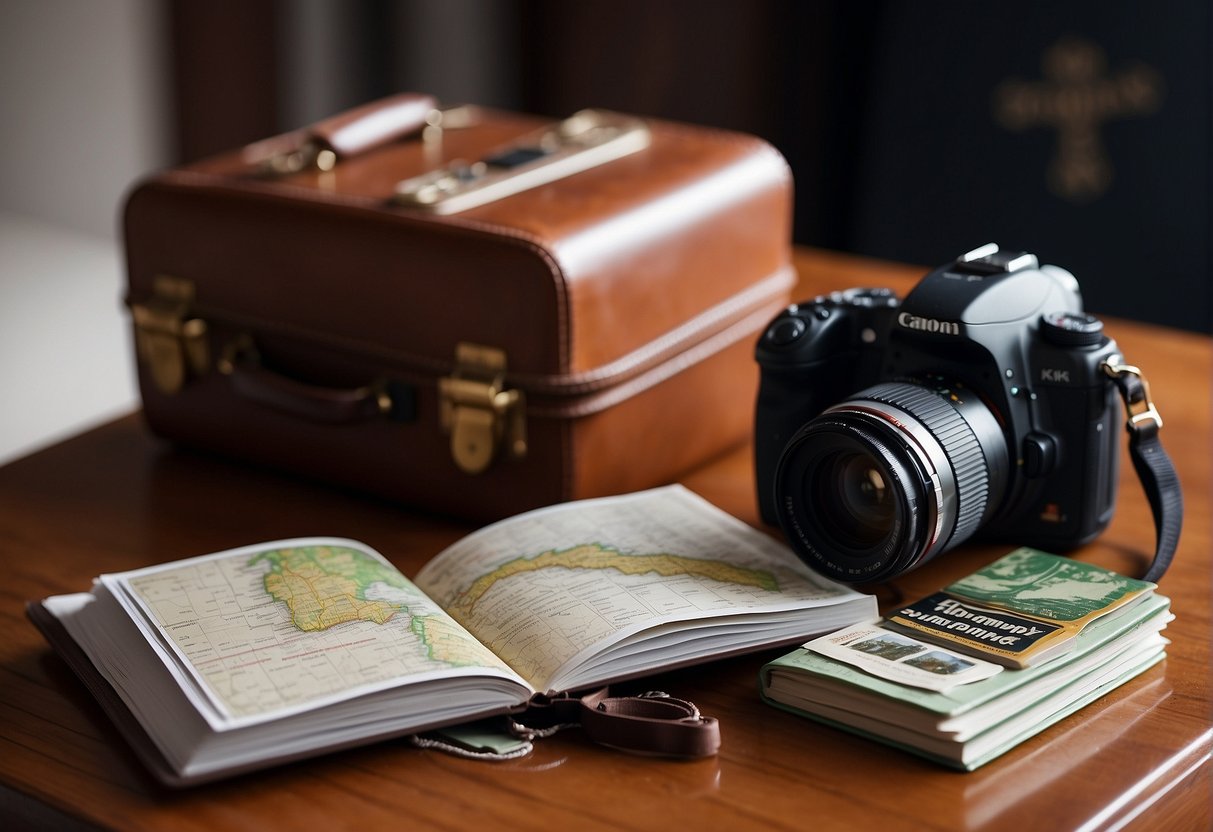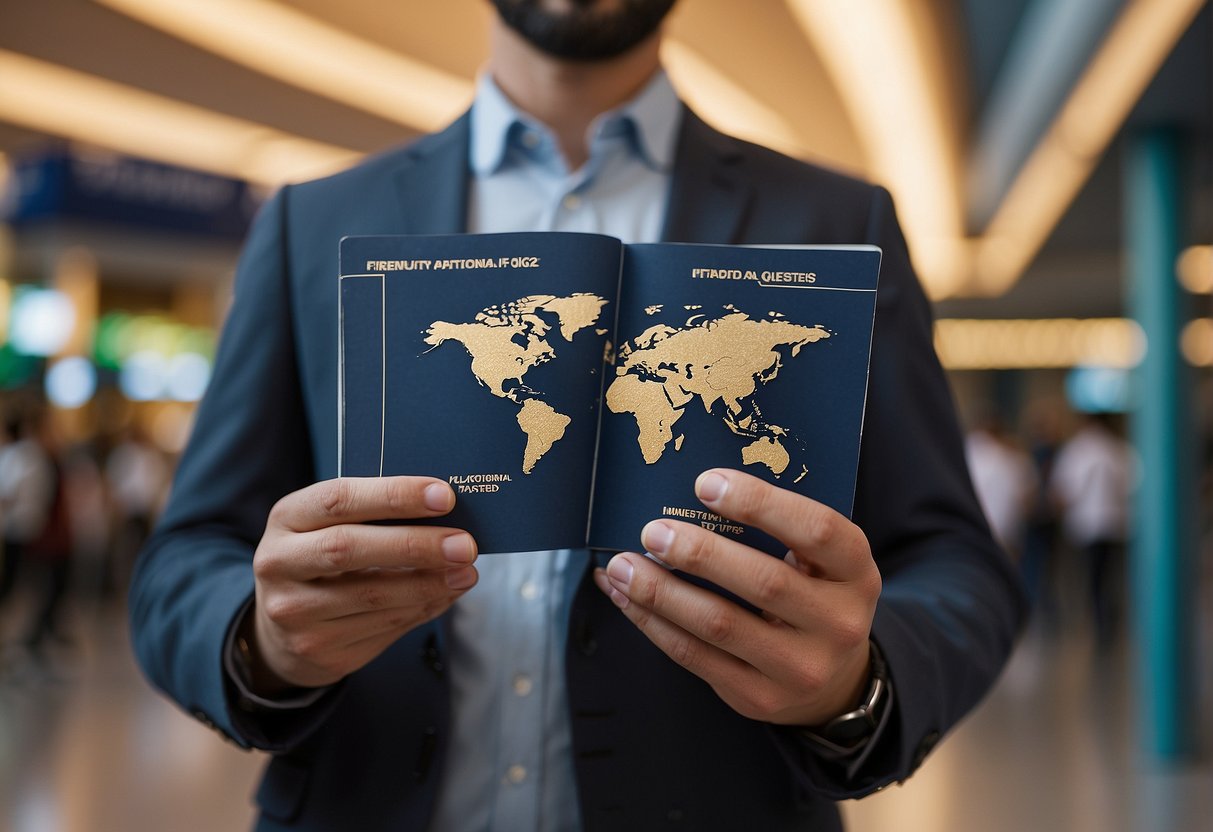Traveling internationally opens a world of opportunities, exposing travelers to new cultures, cuisines, and experiences. Despite the excitement, the process also demands meticulous planning and consideration to avoid common pitfalls. It’s not simply about packing your bags and heading to the airport; there is a slew of considerations from ensuring your travel documents are in order to familiarizing yourself with the destination’s customs and security guidelines.

Anticipating technological needs, managing accommodations during flight, and staying secure in an unfamiliar environment are just as crucial. Each aspect of the journey presents its challenges and opportunities, hence a well-prepared traveler is one who not only enjoys, but also benefits the most from their global explorations. With proper preparation, international travel can be a rewarding experience, brimming with memories that last a lifetime.
Key Takeaways
- Proper planning and understanding travel requirements are foundational for a successful trip.
- Awareness of technological needs and in-flight preparations enhances overall travel comfort.
- Familiarity with safety protocols and local customs is essential for a pleasurable and secure journey.
Preparing for Your Trip
Embarking on an international journey requires careful planning and attention to details ranging from securing the right documents to ensuring your health and safety abroad.
Understanding Your Destination
Researching the destination is crucial; one should gain an understanding of the local culture and laws to respect and adhere to them. One must check voltage requirements for electronics and familiarize themselves with the local currency to avoid financial hassles upon arrival.
Important Travel Documents
Travelers need a valid passport, typically with at least six months’ validity post journey. Additionally, it is essential to check whether a visa is required and apply well in advance. Keeping physical and electronic copies of important documents is a safeguard against loss or theft.
Health and Safety
Prior to departure, travelers should ensure all required vaccinations are up to date, considering any COVID precautions or mandates. It’s also advised to have comprehensive medical insurance for the duration of their stay abroad.
Packing Essentials
Creating a packing checklist can help ensure nothing vital is forgotten. Travelers should consider packing versatile clothing options and a toiletry bag, utilizing packing cubes to organize their luggage. Investing in good luggage for international travel is also recommended for a hassle-free experience.
Financial Planning
Informing the bank about international travels can prevent credit card issues. Understanding foreign transaction fees and locating ATMs that accept one’s card should be part of financial preparations. Keeping funds in a travel wallet helps in managing expenses and reduces the risk of theft.
Within these preparations, items like a best carry-on backpack for international travel, an international travel pack list, a comprehensive travel checklist for international travel, suggestions for good luggage can bring an added layer of convenience and security to your trip. It’s also beneficial to have a list of essentials for international travel to ensure a seamless experience.
Technological Considerations
In an age where technology is intertwined with daily life, it’s crucial to prepare your gadgets for international travel. From ensuring connection to electrical compatibility, these aspects can greatly impact your travel experience.
Essential Gadgets
Travelers should not overlook the importance of essential gadgets like a quality camera to capture memories, and a reliable smartphone which acts as a lifeline to various services abroad. Carrying noise-canceling headphones can be a game-changer for long flights, offering a respite from aircraft’s ambient noise.
Travel Apps and Connectivity
Before departure, individuals should download essential travel apps that aid in navigation, language translation, and local experiences. For uninterrupted connectivity, consider options like an international travel SIM or an eSIM for international travel, and check your provider’s options, such as adjustments in T-Mobile, Verizon, or AT&T’s international travel plans.
Electrical Compatibility
Electrical compatibility is a key factor when traveling abroad. Devices often require a universal travel adapter to fit various sockets. Research the voltage specifications of your destination to avoid damaging your gadgets and consider an international travel adapter plug to ensure your tech accessories can be used anywhere.
During the Flight

When embarking on an international journey, the flight experience can substantially impact one’s overall travel satisfaction. Keeping comfortable, reducing jet lag, and understanding airport processes are crucial to a pleasant journey.
Comfort Measures
Neck pillows and eye masks are invaluable for enhancing comfort on a long-haul flight. They assist in creating a more restful environment by supporting the neck and blocking out cabin light. Passengers are also encouraged to dress in layers for easy adjustment according to the plane’s temperature changes.
For in-flight sustenance, packing your own snacks can make the journey more enjoyable. Nutritious options like protein bars and almonds meet hunger needs without the premium cost of airline food. To ensure a more comfortable flight, travelers should reference tips from those experienced with flying internationally.
Overcoming Jet Lag
Managing sleep patterns is key to combating jet lag. Experts recommend adjusting your sleep schedule a few days before departure to mirror the time zone of your destination. On the plane, using an eye mask and earplugs can aid in falling asleep, while hydration plays a significant role in feeling refreshed upon arrival. For tips on maximizing sleep quality, travelers may find strategies on international flights helpful.
Managing Airport Processes
Navigating immigration and airport security checkpoints efficiently ensures a smoother transition upon arrival and departure. Preparing all travel documents in advance, including visas and e-tickets, speeds up the process. Where available, spending time in an airport lounge can provide a tranquil space to relax before or after a flight. Travelers looking to streamline their airport experience might gain insights from the features of top ten airports in the world.
Ensuring your checked bag meets the airline’s requirements can prevent delays and potential fees. For guidance on baggage policies, one might consult a comparison of best international airlines. Knowing the international flight arrival time is important for coordinating ground transportation and reducing stress upon landing.
Arriving at Your Destination
Upon arrival, it’s essential to navigate local transportation, settle into your accommodations, and respect the local culture and etiquette.
Navigating Local Transportation
Upon disembarking, you’ll encounter various modes of transportation, from trains and buses to taxis and ride-sharing services. Research beforehand or consult with a travel agency for international travel to determine the most efficient and cost-effective options. It’s advisable to carry local cash, as some areas may not accept cards, and knowing the basic language can help in reading signs and communicating with drivers.
Accommodation and Logistics
Secure your accommodations in advance, either through an agency or online platforms offering international vacation packages. When checking in, it’s helpful to verify Wi-Fi access for communication and local information. Keep your important belongings secure and exchange enough local currency for immediate needs. English may not always be spoken at hotels or guesthouses, so learning key phrases in the local language can be beneficial.
Cultural Immersion and Etiquette
Respecting local customs and etiquette is crucial. Take the time to learn about the culture of your destination, possibly through jobs that require international travel, which can offer deeper insight. Remember to dress appropriately according to cultural norms and be open to trying new experiences, such as local cuisine. Speaking English slowly and clearly can facilitate understanding if it’s not the native language, but making the effort to communicate in the local language is appreciated.
Staying Safe and Secure
When traveling internationally, ensuring your safety and security involves being insured and prepared for any emergencies that may arise.
Travel Insurance and Assistance
Securing travel insurance is critical; it protects against unforeseen medical costs, theft, and trip disruptions. Policies vary, so it’s crucial to choose one that fits your specific needs, whether that’s for general, medical, or specialized coverage, like Trawick International Travel Insurance. Always carry proof of your insurance and understand how to get assistance when needed.
Additionally, registering with the Smart Traveler Enrollment Program (STEP) allows the US Department of State to better assist in an emergency. It’s a free service that provides important information from the Embassy about safety conditions in your destination country, helping you make informed decisions.
Emergency Preparedness
In an emergency, knowing how to contact the nearest US Embassy or consulate is essential. Always keep a record of this and other contact information such as local emergency services. Also, familiarize yourself with the U.S. Government’s website, which offers comprehensive resources and updates on international travel alerts.
Prepare a contingency plan for emergencies, and keep a list of essential contacts easily accessible. If trouble arises, staying calm and promptly seeking the appropriate assistance can make all the difference.
Returning Home

When travelers return from their journey, there are immediate and reflective tasks they must attend to. They must ensure they manage post-travel logistics and take time to assimilate their experiences and learnings.
Post-Travel Tasks
Upon their return, travelers should first focus on unpacking their luggage. It is essential to sort through their items, separating laundry and storing away souvenirs. They should also make it a priority to review their travel documents, making sure passports and other important papers are stored safely for future trips.
If they brought back any purchased goods, travelers must follow the correct procedures for declaring these items, adhering to guidelines like those set by U.S. Customs and Border Protection.
People should not forget to organize their travel photos. Whether storing them on a cloud service or creating physical albums, this organization ensures that memories are preserved, and they can easily revisit their adventures.
| Task | Action |
|---|---|
| Unpacking Luggage | Separate items for laundry, store souvenirs and travel documents. |
| Declaring Purchases | Complete necessary forms for customs if applicable. |
| Photo Organization | Digitally archive or create albums for travel photos. |
Reflecting on Your Experience
Reflection is a key part of the post-travel experience. Travelers should take time to think about the learnings from their trip, considering how their perspectives might have changed and what insights they can bring into their everyday lives.
One might journal about their experiences, capture their thoughts on the culture they encountered, the people they met, and the ways in which their experiences have enriched their understanding of the world.
In the weeks following their homecoming, travelers often find that sharing stories and memories with others can be a fulfilling way to reflect on their journey. Speaking about their experiences helps solidify the learnings and ensures that the lessons from their travels remain with them long after their return.
Frequently Asked Questions

When planning an international trip, travelers frequently have questions about preparation, packing, and procedures. The following answers aim to provide clear and concise guidance.
What are the essential items to include on an international travel documents checklist?
Every traveler should ensure their passport is valid for at least six months beyond their trip dates. Additionally, visas, travel insurance documents, and itinerary details are crucial.
How should I prepare for my first time traveling to a new country?
Research is key. One should familiarize themselves with local customs, entry requirements, and safety advisories. It’s also advisable to learn a few key phrases in the local language.
What are the most effective packing tips for international travel?
Packing light and versatile clothing items that can be mixed and matched is essential. Roll clothes to maximize space and consider compression bags to reduce bulk.
Can you list items that are prohibited when traveling internationally?
Common prohibited items include certain liquids in containers larger than 3.4 ounces, sharp objects, and flammable items. Consult the airline’s restrictions ahead of time to avoid issues.
What are some airport tips to know before taking an international flight?
Arrive early at the airport to allow time for checking in, security screening, and possible delays. Also, keep a digital copy of important documents accessible on your phone.
What are the top travel tips that every international traveler should know?
They should be aware of their financial options for accessing money abroad, always have local currency, and be prepared for emergencies by having important contacts written down.
Leave a Reply